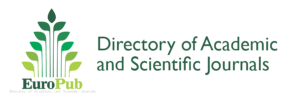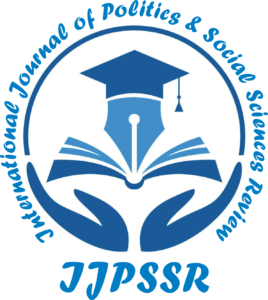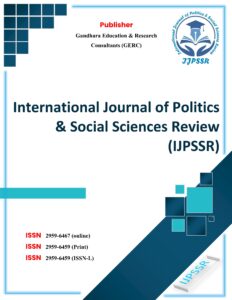PEER REVIEW POLICY OF THE INTERNATIONAL JOURNAL OF POLITICS & SOCIAL SCIENCES REVIEW (IJPSSR)
PEER REVIEW POLICY
International Journal of Politics & Social Sciences Review maintains the highest standards of peer review while increasing the efficiency of the process. All research articles published in IJPSSR undergo full peer review, key characteristics of which are listed below:
- All research articles are reviewed by at least two prominent qualified experts.
- All publication decisions are made by the journals’ Editors-in-Chief on the basis of the reviewers’ reports provided.
- Members of the International Editorial Boards lend insight, advice, and guidance to the Editors-in-Chief generally and to assist decision making on specific submissions.
- Managing Editors and Editorial Assistants provide the administrative support that allows IJPSSR to maintain the integrity of peer review while delivering rapid turnaround and maximum efficiency to authors, reviewers and editors alike.
- IJPSSR additionally benefit through the manuscript referral process from the high-quality peer review conducted by established journals.
COMMON REASONS FOR MANUSCRIPT REJECTION
Manuscripts can be rejected for many reasons, but these can generally be divided into technical and editorial reasons.
Technical reasons usually require more work such as further experiments or analysis before your work can be published. Technical reasons for rejection include:
- Incomplete data such as too small a sample size or missing or poor controls
- Poor analysis such as using inappropriate statistical tests or a lack of statistics altogether
- Inappropriate methodology for answering your hypothesis or using an old methodology that has been surpassed by newer, more powerful methods that provide more robust results
- Weak research motive where your hypothesis is not clear or scientifically valid or your data does not answer the question posed
- Inaccurate conclusions on assumptions that are not supported by your data
These rejection reasons can be avoided by investing enough time in reading around the subject area, carefully deciding on the topic to focus on, the hypothesis and planning a comprehensive experiment as outlined in the IJPSSR: Writing a Journal Manuscript.
EDITORIAL REASONS FOR REJECTION INCLUDE:
- Out of scope for the journal
- Not enough of an advance or of enough impact for the journal
- Research ethics ignored such as consent from patients or approval from an ethics committee for animal research
- Lack of proper structure or not following journal formatting requirements
- Lack of the necessary detail for readers to fully understand and repeat the authors’ analysis and experiments
- Lack of up-to-date references or references containing a high proportion of self-citations
- Has poor language quality such that it cannot be understood by readers
- Difficult to follow logic or poorly presented data.
- Violation of publication ethics
These rejection reasons can be avoided by following the journal specific guidelines, ensuring you write a coherent paper in good English and honestly assessing your work when deciding on a target journal. All of these points are covered in writing a Journal Manuscript.
INITIAL MANUSCRIPT EVALUATION
The Editor first evaluates all manuscripts. It is rare, but it is entirely feasible for an exceptional manuscript to be accepted at this stage. Those rejected at this stage are insufficiently original, have serious scientific flaws, have poor grammar or English language, or are outside the aims and scope of the journal. Those that meet the minimum criteria are passed on to at least 2 experts for review. Authors of manuscripts rejected at this stage will normally be informed within 2 weeks of receipt.
TYPE OF PEER REVIEW
This journal employs double-blind reviewing, where both the referee and author remain anonymous throughout the process.
SELECTION OF REVIEWERS
Referees are selected to the manuscript according to their expertise, reputation, experience, and qualification. IJPSSR gets reviewers’ consent before sending them manuscripts for review. Our database is constantly being updated. The IJPSSR has a policy of using Triple-blind refereeing, with neither referee from the country of the submitting author. We welcome suggestions for referees from the author though these recommendations may or may not be used.
CRITERIA FOR REFEREE REPORTS
Referees are asked to evaluate whether the manuscript:
- Is original
- Is methodologically sound
- Follows appropriate ethical guidelines
- Has results which are clearly presented and support the conclusions
- Correctly references previous relevant work
Referees are not expected to correct or copyedit manuscripts. Language correction is not part of the peer-review process.
EXPECTED TIME FOR REVIEW PROCESS
Typically, the manuscript will be reviewed within 3 months. Should the referees’ reports contradict one another, or a report is unnecessarily delayed a further expert opinion will be sought. All our referees sign a conflict of interest statement. Revised manuscripts are usually returned to the initial referees within one week. Referees may request more than one revision of a manuscript.
FINAL REPORT
A final decision to accept or reject the manuscript will be sent to the author along with any recommendations made by the referees and may include verbatim comments by the referees.
EDITOR’S DECISION IS FINAL
Referees advise the editor, who is responsible for the final decision to accept or reject the article.
ORIGINALITY OF MANUSCRIPT
IJPSSR accepts manuscripts for consideration with the understanding that:
- Manuscripts are original material and are not under consideration for publication/ published elsewhere.
- (not plagiarized) and those who contributed in various capacities have either been included as authors or have been duly acknowledged.
- For any type of plagiarism, the author (s) will be the sole responsible.
- The authors will have to fill an undertaking form to authenticate the originality of the manuscript and adherence to the publication ethics. IJPSSR believes that authors must follow the publication ethics and malpractices policies as laid down by COPE and APA.
- The paper is published after its clearance for plagiarism as per HEC policy.
- In case of any breach of policy rules are found, the editorial team reserves the right to take legal action/ penalty as decided accordingly.
The Little Books of Plagiarism
This booklet is based upon “The Little Books of Plagiarism”
The little book of plagiarism What it is and how to avoid it
HEC Plagiarism Policy
Chambers Dictionary defines a plagiarist as a kind of thief
“one who steals the thoughts or writings of others and gives them out as…..
How HEC Deals Plagiarism?
There is a well thought out process to assess if Plagiarism
Plagiarism detection software are tools to assist experts so that they……
Plagiarism Policy
In the wake of fundamental improvements being introduced
the credit, respect, recognition of research and scholarly publications…..
Indexed by
















